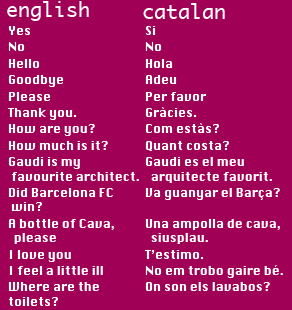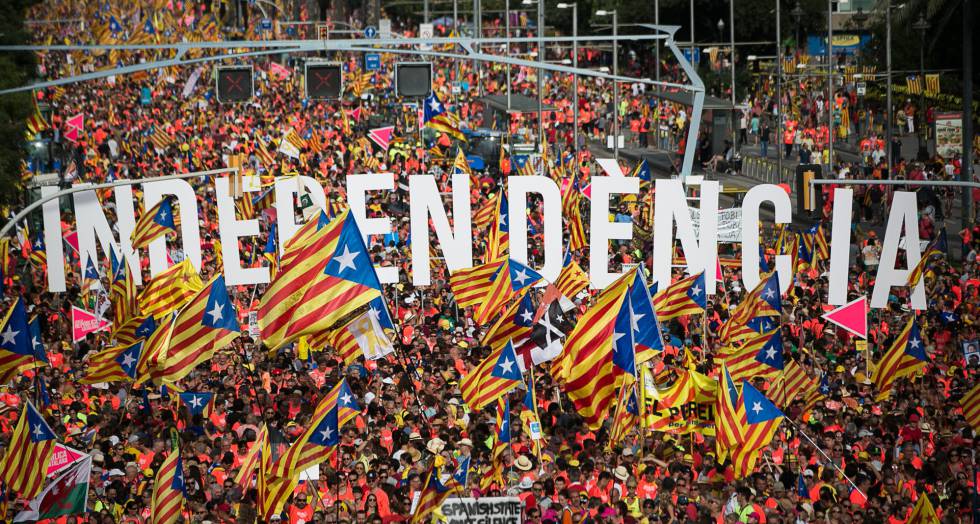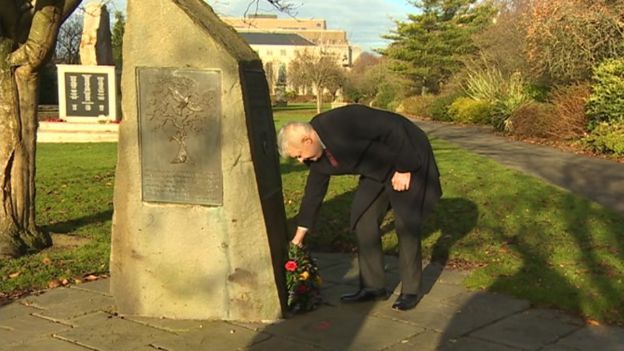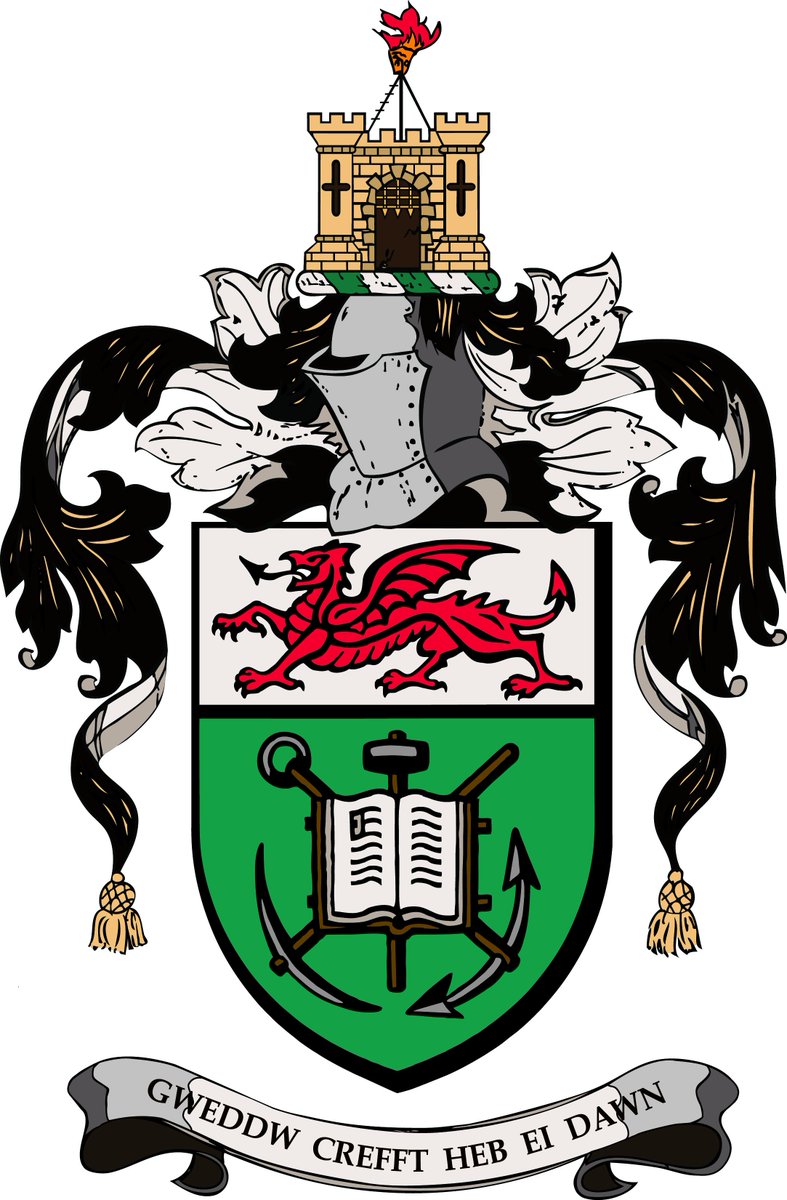Having struggled through years of incomprehensible
lessons in the Spanish language and failed to learn it with the requisite
fluency that my stay in Spain would seem to demand, I have taken it upon myself
to fail to learn Catalan too.
Let it be said at once that I do have two
qualifications (of sorts) in Spanish and that, in spite of my signal inability
to come to terms with even the most straightforward of verbs in the language, I
do find that I can flannel my way through conversations (or monologues) in most
everyday situations and, although my partners in this unequal linguistic
exchange come away paler and older than when they first encountered me and my
‘way with the foreign words’, they also (generally) seem to understand what I
have been on about.
I take this admittedly low bar of foreign
communication as an achievement, and am prepared to give it my best in Catalan.
I have had my first three lessons, in the same school
that has been valiantly trying to teach me Spanish. For the princely sum of 10 (ten) Euros I am
now enrolled for 150 hours (one and a half hours twice a week, Tuesdays and
Thursdays) for the next year.
Unlike my Spanish courses, where because of my
specious confidence in attempting to speak the language I started in media res, so to speak, in Catalan I
start at the very lowest entry level.
And that has to be a good thing, as from the lowest of
the low, the only way is, of course, up.
At least that is the theory to which I am adhering and in which I fondly
believe.
By way of preparation for the first class I learned
the days of the week in Catalan (though not how to spell them – little by
little does it!) and how to give my name and nationality.
My nationality (a moveable feast at the best of times)
is firmly placed in Wales when asked about it in foreign lands. Catalonia’s National Day (11th
September, the Diada) marks a disaster in the history of the country when the
final outcome of the War of the Spanish Succession was finally decided in
favour of the Bourbons and not the Hapsburgs.
England had been firmly on the side of the Hapsburgs, as had the
Catalans, and the Catalans were assured that England would stick by them
whatever the outcome. That commendable
solidarity lasted right up to the defeat when the English hightailed it out of
the conflict leaving their erstwhile Catalan allies to take the
consequences.
And severe consequences they were including the loss
of Catalan territories in France on the other side of the Pyrenees; the
destruction of the walls of Barcelona; the imposition of a Madrid appointed
governor (just like the actions of the systemically corrupt PP government of
recent memory); the suppression of the Catalan language (a go-to stance for all
Spanish, Fascist, Right-Wing, nasty people), and various other humiliations. This is what the National Day
celebrates.
It is hardly surprising that it is also a focus of
nationality when more than a million people (or a few thousand if you read the
Spanish press) take to the streets. So,
you can see why I distance myself from the perfidious Albion in this part of
the world and emphasise the Welsh upbringing that I had – Wales having provided
a higher ‘volunteers per 100,000 of the population’ to fight in the
International Brigade against Franco and the Fascists than other parts of the
United Kingdom. And there is a monument to the fighters of the International Brigade in Cathays Park in Cardiff.
Actually I wouldn’t bet
my life on that statistic, but I believe it to be true – and in the ‘World
According to Trump’ that is all I need!
 The only drawback to my Welshness in Catalonia,
specifically in my language school, is that I am called on to provide words and phrases
in my assumed national language to be written on posters on the walls to
emphasise the multi-cultural background of the institution and to parade its
diversity. Unfortunately my suggestions
of “Towards the light” (school motto);
The only drawback to my Welshness in Catalonia,
specifically in my language school, is that I am called on to provide words and phrases
in my assumed national language to be written on posters on the walls to
emphasise the multi-cultural background of the institution and to parade its
diversity. Unfortunately my suggestions
of “Towards the light” (school motto);
“Bereft is he of craft without inborn
gift” (college motto);
“Truth, Unity and Concord” (my other university);”
Awake,
it is day” and “The red dragon leads the way” (city mottoes) were not acceptable
as I knew them (or at least knew how to spell them) only in English. My Catalan teachers wanted actual Welsh and I
am ashamed to admit that I had to look up the Welsh before I submitted them to
be written up!
The differences between Catalan and Spanish are not
anything like so great as those between English and Welsh. This is hardly surprising as Catalan has
strong links to the group of languages derived from Latin; the links with
Spanish and French are especially strong and some words differ more in their
spelling in these languages than their pronunciation. But Catalan is a distinct language and, like
all minority languages comes filled with political and social overtones when
you attempt to learn it.
In the part of Catalonia in which I live, in the city
of Castelldefels, just outside Barcelona, I do not think that Catalan is the
majority language. This area has seen a
vast influx of workers from other parts of Spain who have gravitated to
Catalonia to take advantage of the job opportunities that such a highly
industrialized part of Spain offers.
Catalonia is a rich part of Spain – and a potentially richer part,
independentistas argue if it finally separates itself from the other regions
and attains nationhood.
In the present febrile atmosphere, where the
repercussions of the vicious attempted suppression of the referendum vote for
Catalan independence by the Spanish State still reverberate: Catalan and
Catalonia are flashpoints and discussion is divisive and at times bitter.
Among those who count themselves as Catalans, there is
probably an overwhelming majority who would vote for independence; but there is
a sizeable proportion of the population in Catalonia who see themselves as
Spanish speaking Spaniards before they consider themselves Catalan – and that
particular segment of the population is adamantly opposed to independence.
In the last election the population of Catalonia
elected a majority of representatives who were (in theory) pro-independence. Admittedly, the largest single party
comprised C’s a repulsive party composed of political sluts who have achieved
nothing and have exerted all their energies to trying to scrape their way to
power with whoever and whatever will serve their purposes. They are, however, a minority, and however
they try and spin it, a majority in parliament in Barcelona seeks greater power
for the region. I say region there,
because some of the groupings opposed to the unutterable shower of C’s have
back peddled on moving towards independence and are engaged in muddying the
waters to try and find ‘another’ way to resolve the situation, stopping well
short of cutting themselves adrift from the encumbrance of Spain.
There are no easy answers to the political situation
in Catalonia, and the gratuitous police violence that we saw against the
peaceful demonstrations on Saturday marking the anniversary of the police brutality
when they attempted to stop the referendum taking place on the question of
independence, merely hardens attitudes on both sides.
Brexit, Trump and Catalonia are all ‘situations’ that
require bi-partisan politics to produce satisfactory solutions. There seems little chance of that in the ‘winner
takes all’ approach that seems to govern politics nowadays.
Politics should be the art of the possible, not the
fist of the powerful.
Meanwhile, I will cultivate my garden with writing and
the learning of a new language.
Every
little helps!






No comments:
Post a Comment